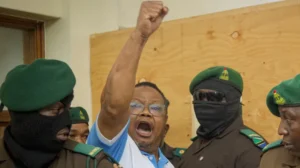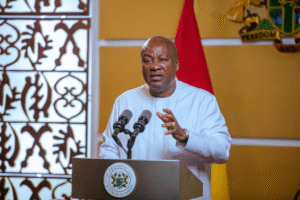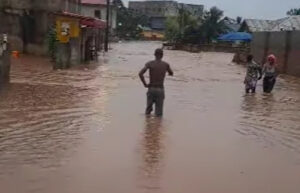
Energy and Green Transition Minister John Jinapor has refuted claims that he is employing “fear tactics” in addressing Ghana’s current energy challenges. Instead, he emphasized his commitment to implementing strategic solutions to stabilize the nation’s power and fuel supply.
The minister’s remarks come in response to criticism from energy experts and political figures, including Walewale MP Tia Abdul-Kabiru Mahama, who accused him of inciting public concern without offering concrete solutions .
Speaking on Citi FM on Monday, May 19, 2025, Mr Jinapor clarified that his recent presentation to Parliament’s Energy Committee was intended to provide factual information and propose actionable strategies, not to express frustration.
“I understand grumbling very well, and I don’t think that when you appear before a committee and you present facts, they term that as grumbling. Unless, as a minister, I needed to hide that fact,” he stated.
Addressing Immediate Concerns
Minister Jinapor highlighted several interventions undertaken by the ministry to address pressing issues:
- Resolving a potential shutdown by Karpowership, ensuring continued power supply.
- Expanding generation capacity through the introduction of new power plants.
- Initiating structural reforms aimed at stabilizing the energy sector.
“The facts are that Karpowership threatened to shut down, and we resolved the matter; that is not grumbling, that is solving the problem. It is sitting around the table to find the solution,” he added.
Strategic Long-Term Initiatives
Looking ahead, the minister outlined medium- and long-term strategies, including:
- Reducing reliance on liquid fuels by enhancing domestic gas processing capabilities.
- Encouraging private sector participation in electricity billing to improve revenue collection.Reuters
“ECG said they want private sector participation; we have inaugurated a committee, and they have done stakeholder consultation, and now we have to move on to implementation. That is not grumbling. It is dealing with the challenges,” he explained.
Current Energy Landscape
Ghana’s energy sector is currently facing significant challenges:
- The country aims to reduce its $2.5 billion debt owed to independent power producers and gas suppliers by the end of 2025.
- State-owned utility ECG is experiencing inefficiencies, with a reported 40% revenue loss, prompting considerations for private sector involvement in billing processes.
- Electricity demand has surged, with a system peak load of 3,952 megawatts recorded in December 2024, highlighting the need for increased generation capacity.
Commitment to Transparency and Solutions
Minister Jinapor emphasized his commitment to transparency and proactive problem-solving:
“Parliament also wanted the statistics of all our fuel stocks, and I gave them to them. I also went further to say that we have ordered fuel, and we are getting those today, to replace what we have in stock.
I didn’t say we will have a challenge; I didn’t say we have a crisis. We are not in crisis; we are doing fairly well. Yes, we have challenges, but that is why we were voted into power—to solve those challenges. If I am putting a solution across, that solution should be dealing with a challenge,” he concluded.
As Ghana navigates its energy challenges, the ministry’s focus remains on implementing effective strategies to ensure a stable and sustainable energy future for the nation.






